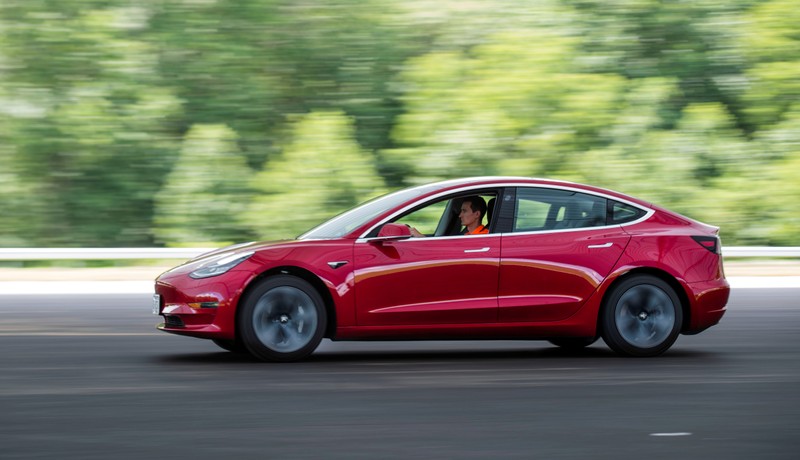
FILE PHOTO: Joe Young, media relations associate for the Insurance Institute for Highway Safety (IIHS), drives a 2018 Tesla Model 3 at the IIHS-HLDI Vehicle Research Center in Ruckersville, Virginia, U.S., July 22, 2019. Picture taken July 22, 2019. REUTERS/Amanda Voisard/File Photo
August 7, 2019
By Ben Klayman
DETROIT (Reuters) – Electric carmaker Tesla Inc <TSLA.O> received a cease-and-desist letter last year from U.S. regulators for making “misleading statements” over safety ratings of its Model 3 sedans as well as two subpoenas related to crashes involving its cars, according to documents seen by Reuters.
An Oct. 17, 2018, letter shows the U.S. National Highway Traffic Safety Administration (NHTSA) accused Tesla of failing to conform to the agency’s guidelines when it claimed the Model 3 had the lowest probability of injury of any vehicle ever tested by NHTSA.
Tesla, founded and run by Silicon Valley billionaire Elon Musk, on Wednesday stood by its safety claims, saying it used NHTSA’s own data to back them up. The documents also showed that the carmaker filed a confidential response in August 2018 to one of the subpoenas from that April.
NHTSA said it was referring Tesla’s safety claims about the Model 3 to the Federal Trade Commission (FTC) to investigate whether the automaker’s statements constitute unfair or deceptive acts or practices.
An FTC spokesman declined to comment, saying “investigations are non-public, and we don’t comment on … the existence of an investigation.”
Asked about the documents, a Tesla spokesman on Wednesday pointed to statements made in the company’s Oct. 31, 2018, letter to NHTSA in which it maintained that the Model 3 had the lowest risk of occupant injury of any vehicle in U.S. government tests.
In that letter, the company’s deputy general counsel, Al Prescott, said: “Tesla’s statement is neither untrue nor misleading. … We had hoped NHTSA would welcome such an achievement because it was presented in an objective manner using the agency’s own data.”
NHTSA did not immediately respond to multiple requests for comment by phone and email. In its Oct. 17 letter to Musk, it said Tesla’s safety claim was “inappropriate” and “inconsistent” with the agency’s guidelines.
“The guidelines warn against comparison statements like these because such statements mislead consumers about the relative safety of different vehicle models,” NHTSA chief counsel Jonathan Morrison said in the letter.
“To say Tesla’s midsize sedan has a lower probability of injury than say a larger SUV could be interpreted as misunderstanding safety data, an intention to mislead the public, or both,” he added.
The Model 3 had received the top rating on the agency’s 5-Star Safety Ratings Program that uses three crash tests and a rollover resistance assessment.
The U.S. Department of Transportation released the documents after legal transparency group PlainSite obtained them under the Freedom of Information Act (FOIA).
Tesla has still not changed the blog post that says its cars “are engineered to be the safest cars in the world.”
It also says Tesla cars “have achieved the lowest probability of injury of any vehicle ever tested by the U.S. government’s New Car Assessment Program.”
Safety groups have criticized Tesla for being unclear about the need for “hands-on” driving with its autonomous driving feature.
The carmaker’s use of the term “full self-driving” garners criticism, as the option is not yet “Level 4,” or fully autonomous by industry standards, in which the car can handle all aspects of driving in most circumstances with no human intervention.
(Additional reporting by Supantha Mukherjee and Sathvik N in Bengaluru and David Shepardson in Washington; Editing by David Gregorio)

